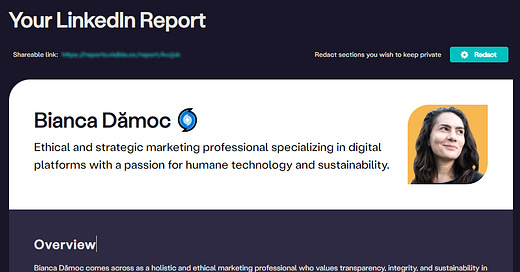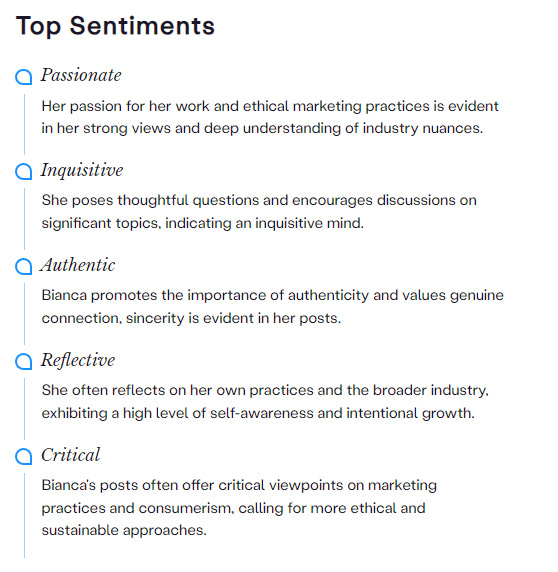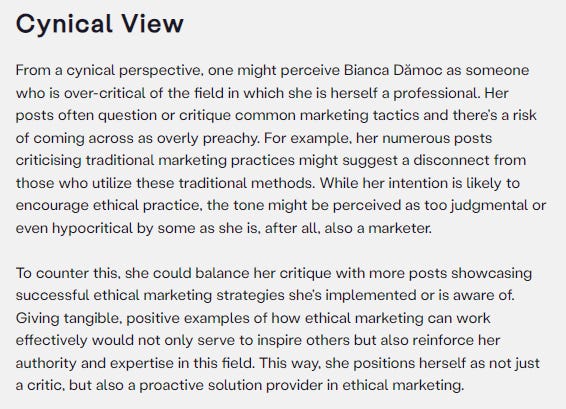How to Use Your LinkedIn Perception Report
And what we've learned after running 2000 reports and 100 feedback calls.
Approximately one month ago, we launched our very first product to market - a LinkedIn Perception Report by Visible.
(If you haven't already requested your LinkedIn Report, I encourage you to do so now, while we're still making it available for free)
After running almost 2000 reports and 100 feedback calls, we were able to identify a handful of common themes that crept up with an almost predictable cadence:
the importance of having an objective perspective,
the cynical view as a necessary evil,
the reassurance of a scam-o-meter, and others.
As I go through these themes and start extracting insights, I'll offer snippets from my own LinkedIn Report for context - at no point will I be exposing any of the content generated from our users or their feedback.
This early release feature is an AI report that allows you to see how others perceive you based on your public profile and your last 20 comments and posts on LinkedIn. We have plans to integrate more data points in the future.
Start With an Overview and a Great Headline for Your Entire Activity on LinkedIn.
Ethical and strategic marketing professional specializing in digital platforms with a passion for humane technology and sustainability.
! Pro Tip ! Since generating the report, I have used this exact sentence on various platforms, signatures, and other places that required a short bio. Many of our users are now using it as their LinkedIn Headline.
I found the Overview to be a good sense-check for how I come across overall. I am very intentional about the image I portray on LinkedIn and the overview confirms that I am on the right track.
This line was particularly validating: "She appears to have a diverse range of experience, and her versatility is evident in the various roles and industries she's been part of."
With LinkedIn, it is often the case that having a non-linear career path is perceived as a negative. As an inability to commit yourself fully to a niche, or an expertise. I appreciated the report highlighting the versatility that such a diverse experience brings, instead of other myopic stereotypes.
The Hot Topics Are The Pillars of Your LinkedIn Identity
After looking through hundreds of LinkedIn reports, I realized the hot topics are more than just "a list of things I talk about." In my case, ethical marketing, sustainability, and the impact of AI are not just topics of conversation; they're narrative drivers, responsible for shaping and reflecting my professional ethos.
Hot topics are a great way to check for cultural fit, both with other companies and other people in your network if you choose to check for comparisons.
Sentiments, on the other hand, are the emotional reactions drawn from the audience.
I was branded as passionate, inquisitive, authentic, reflective, and critical - all sentiments I am happy to stand behind.
It is inevitable that there will be other professionals in your niche, that talk about the same things you do. However, what you can avoid, is doing it in the same robotic way they do.
Sentiments are the invisible threads connecting us to our audience, fostering meaningful conversations.
Another great sense-check and an opportunity to reflect and possibly change if the sentiments are not in line with your persona.
Writing Style - Posts vs Comments
Even after having written hundreds of posts on LinkedIn, I still find the process challenging.
There's a degree of self-imposed sanitization of one's personality on this platform - be professional but not unapproachable, realistic but not cynical, polarizing without getting cancelled, etc.
Seeing the report pick up on the different ways I write posts vs the way I interact in the comments section, was a cause for pause. I appreciated the constructive criticism related to storytelling and maintaining a professional balance.
The Cynical View: A Necessary Evil?
Whenever we do feedback calls, this is the one section people always bring up. They either love it, or hate it. There is no in-between.
I love it.
I love it because it is unrealistic to expect everyone online to like you and consume all of your content without criticism.
We all operate on a certain dose of cynicism - recruiters, clients, colleagues, even our parents. Whether or not they are willing to call us out on it, is a different question, and it's also a missed opportunity for growth.
My posts were flagged as too critical, preachy and hypocritical - things that are all true.
"To counter this, she could balance her critique with more posts showcasing successful ethical marketing strategies she's implemented or is aware of... it would not only serve to inspire others but also reinforce her authority and expertise in this field." - sensible advice that I've already taken on board.
I would encourage you to at least be curious about the cynical view section, and reflect on whether or not there's a kernel of truth in there, even if you decide not to take the advice.
The Importance of Personal Protection
The report itself is divided between Perception and Protection.
And while I've gone through some of the sections pertaining to perception above, those related to online privacy I have chosen no to, as they are, in fact, private.
Just to name them, the report told me whether:
I have revealed any personal identifiable information;
there are any red flags (posts or comments contain hate speech, insults or bullying, narcotics, obscene language, political speech etc.)
there are elements in my activity that can be misconstrued or taken out of context for negative portrayal;
there are any scam scenarios I should be made aware of and how I can safeguard myself against such threats.
The Power of Self-Awareness
One pivotal lesson from the report speaks to the power of self-awareness.
It is very easy to drown yourself in the analytics dashboard provided by LinkedIn and to create content based on your views, followers and comments. And while these numbers certainly have their place in the world, they don't speak to the whole picture - there are real, human, eyeballs sitting on the other end of the screen that judge us based on the image we're putting out there. Based on what they perceive us to be.
Do you like what they're seeing?
LinkedIn Perception Report: A Self-Reflective Journey For You?
LinkedIn used to be a digital resume. Today, it's a dynamic personal branding tool. It's your business card, portfolio, and a testament to your thought leadership, all rolled into one.
As is the case with most social media platforms, you think you are passing on a message, but the truth is more nuanced. Our LinkedIn Report tries to shine light on some of that nuance.
Hot topics, sentiments, writing style - these are objective mirrors held up to our digital selves. They reveal our strengths, pinpoint areas for improvement, and underline the potential risks.
If your professional life is, at least in part, influenced by LinkedIn.
If you're a job seeker, a deal seeker or a thought leader.
If you're the kind of person that likes to continuously improve and develop better self awareness, in an asynchronous way.
This is for you.
Request your LinkedIn Report here.









